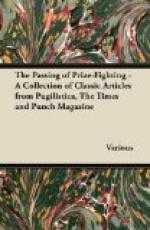Ah, it is cruel! Our beauty is decayed. The cheeks of my poor sister, that once were so rosy, have lost their colour and our figures their rounded grace.
We are loyal, Monsieur, and, though we are no longer pleasing to look upon, we do not grudge our service. But we beg of you, kind M. Punch, to procure for us a respite from our labours, that we may recover something of our former lustre. Thus shall you merit the undying gratitude and your countrymen regain the devoted services of what were at one time three of France’s fairest billiard-balls.
Agreez, cher Monsieur, etc., etc.
* * * * *
[Illustration: First Actor (in khaki, to second ditto). “HULLO, OLD BOY—WORKING?”
Second Actor. “YES, OLD CHAP, AND HAIG HAS BOOKED ME FOR THE AUTUMN TOO.”]
* * * * *
THE FATAL EMBRACE.
“There is a good story of how at an election meeting in Cork a few years ago, when he was a candidate, one of a crowd of working women pushed her way into a brake from which he was addressing a throng in the market square and suddenly put her arm round his neck and killed him.”—Times of India.
* * * * *
“At the Port Elizabeth Town Council meeting, Mr. Mackay asked could nothing be done to the seats at Homewood? The resin was oozing out of them. He had had a valuable pair of pants completely ruined, and the same thing might happen to any lady.”—South African Paper.
Our trousered Amazons must not be discouraged.
* * * * *
[Illustration: “PRISONER, WHEN ARRESTED, CLUNG TO THE RAILINGS.”]
* * * * *
[Illustration: “PRISONER, WHEN ARRESTED, CLUNG TO THE RAILINGS.”]
THE TWELFTH—NEW STYLE.
(DREAMT IN A DUG-OUT.)
In my dream it was my first Twelfth after the ending of the War.
The party moved off in file up the slope of the moor, Sir Percy on his pony in front, then the guests with rifles at the trail, next the bearers and orderlies, and in the rear the ammunition-limbers and regimental baggage. A ration-party would follow later. There was to be no singing on the march, but pipes were allowed.
Just as we neared the crest of the hill, at a notice bearing the legend, “Keep below,” the whole party entered a deep “boyau” leading right up to the trenches in front, from which branched off various passages to the gun pits, or butts, as we used to call them.
Our position was semi-circular in form and about three-quarters of a mile long; its main strength lay in a chain of machine-gun emplacements at intervals of about two hundred yards. These were, needless to say, all armoured, but it was nevertheless considered bad form to fire along the line.




